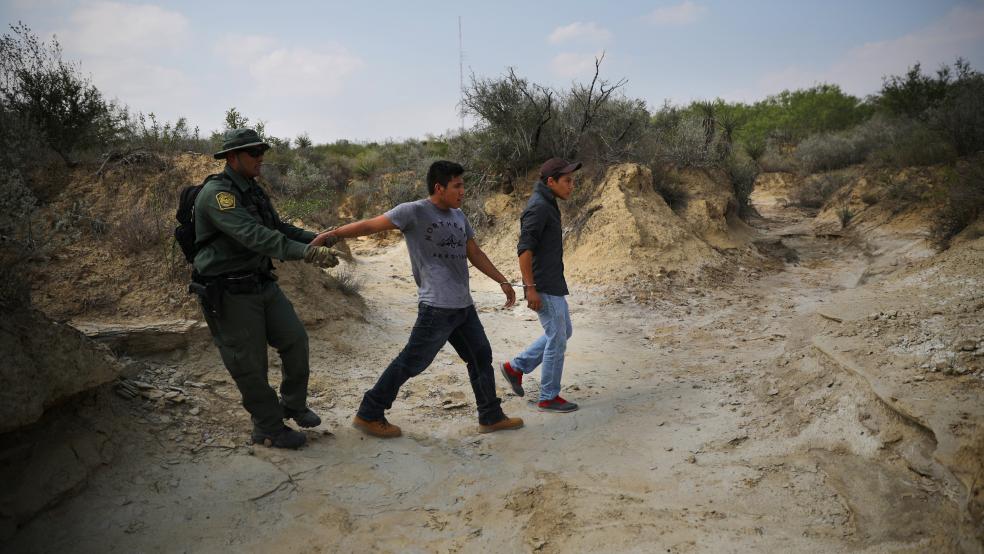The Trump administration surprised many of the president’s critics on Thursday night when it suggested that the administration plans to leave President Obama’s Deferred Action for Childhood Arrivals (DACA) program in place more or less untouched, despite a campaign dedicated to demonizing undocumented immigrants and promising their deportation.
The wording of the announcement had an air of permanence to it. Near the end of a Department of Homeland Security announcement that the administration was rescinding a never-implemented Obama-era rule protecting the undocumented parents of U.S. citizens and lawful permanent residents, was this sentence: “The June 15, 2012 memorandum that created the Deferred Action for Childhood Arrivals program will remain in effect.”
Related: Trump Administration Takes Aim at Funding for Sanctuary Cities
The immediate reaction was pleasant surprise from some immigrants’ rights activists. But within hours, the Trump administration clarified that the statement about DACA shouldn’t be over-interpreted. All it was doing, a spokesman said, was making it clear that the decision to rescind the Delayed Action for Parents of Americans and Lawful Permanent Residents (DAPA) wasn’t immediately affected, leaving the door open to future changes to the program, or even its elimination.
“There has been no final determination made about the DACA program, which the president has stressed needs to be handled with compassion and with heart,” said Jonathan Hoffman, a DHS spokesman.
For many, the dust-up over immigration rules raised some basic questions.
What is DACA?
The Deferred Action for Childhood Arrivals program was put in place by the Obama administration in 2012, and was designed to shield people who had been brought to the U.S. illegally as children from deportation. To qualify, individuals had to have arrived in the U.S. by a specific date and meet other requirements, including compliance with the law and pursuit of an education.
In exchange for registering with the government, DACA recipients were allowed to remain in the U.S. and were given the ability to legally work and study in the country without fear of deportation. Although the program was criticized as an illegal grant of amnesty, it technically never removed the threat of eventual deportation from recipients. It merely indicated that, for the time being, they were allowed to stay in the country legally.
Related: Some Sanctuary City Officials Will Stonewall Trump Over Criminal Deportations
What is DAPA?
Even more controversial than DACA, the Deferred Action for Parents of Americans and Lawful Permanent Residents was similar in that it created a means for illegal immigrants to remain in the country with the permission of the federal government. However, the recipients of DAPA status would have been adults, many of whom crossed the border knowing that it was illegal for them to remain in the U.S.
Because a child born in the U.S. is a de facto U.S. citizen, immigration laws created a system by which the government was effectively deporting its own citizens when it forced the undocumented parents of a U.S.-born child to leave the country, because the child would typically be taken with them.
DAPA was never actually implemented, because a federal judge in Texas blocked the Obama administration from moving ahead with it after more than two dozen states challenged its constitutionality. The Supreme Court, then with only eight members, heard the case but deadlocked at 4-4. The effect of the tie was to leave the lower court ruling in place, meaning that the order was never implemented.
Does this affect current DACA beneficiaries?
While the uncertainty created by the Trump administration’s stance is real, Thursday night’s announcement offered at least some short-term reassurance that there won’t be immediate disruptions for those currently working in the U.S. under the program.
Related: The Hidden Effect of Trump’s New Immigration Orders
“DACA recipients who were issued three-year extensions before the district court’s injunction will not be affected, and will be eligible to seek a two-year extension upon their expiration,” DHS clarified. “No work permits will be terminated prior to their current expiration dates.”
Why are some activists unhappy?
The primary concern for DACA recipients is the lack of certainty they are faced with under the Trump administration. Many remember quite clearly the president’s insistence that every single undocumented immigrant in the U.S. would be deported after his election. The promise was widely viewed as unrealistic, but that made it no less frightening to the undocumented -- especially those that had trusted the government and provided their names, addresses and other information that would make tracking them down and deporting them a simple matter for federal immigration authorities.
The administration’s reminder that “no final determination” had been made regarding the DACA program was seen as confirmation that those benefiting from the program remain in limbo.





